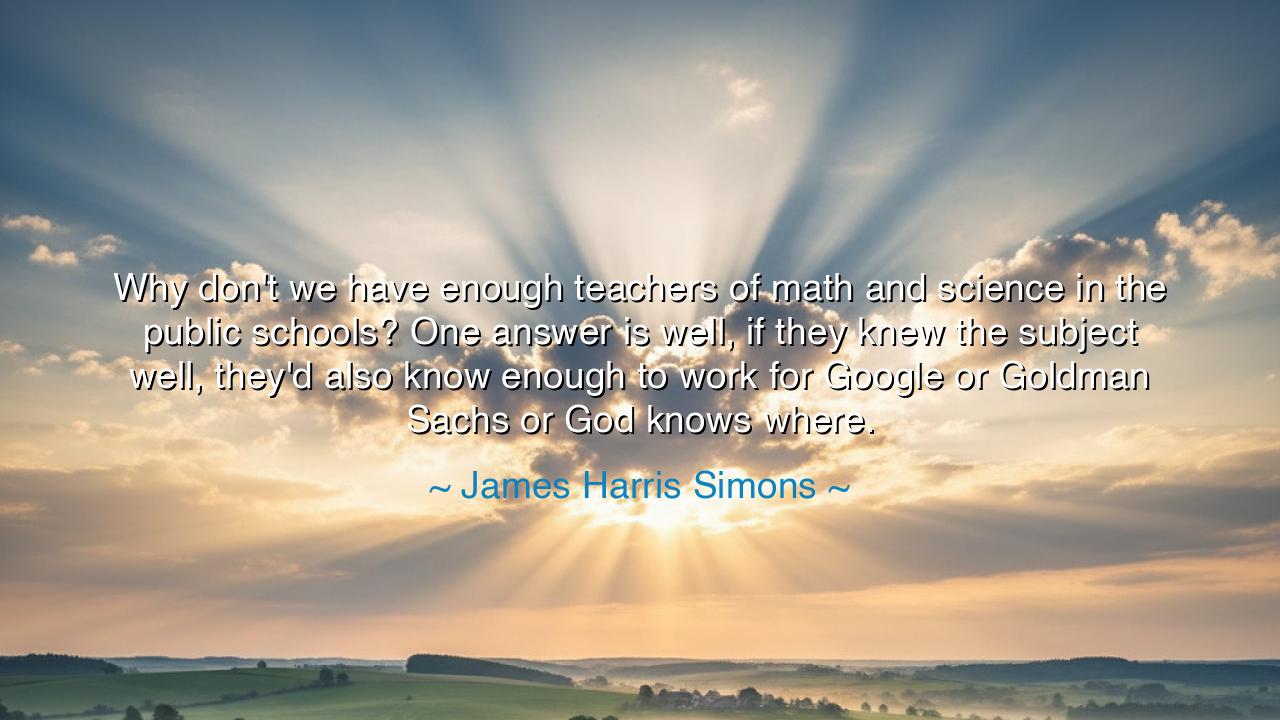
Why don't we have enough teachers of math and science in the
Why don't we have enough teachers of math and science in the public schools? One answer is well, if they knew the subject well, they'd also know enough to work for Google or Goldman Sachs or God knows where.






"Why don't we have enough teachers of math and science in the public schools? One answer is well, if they knew the subject well, they'd also know enough to work for Google or Goldman Sachs or God knows where," said James Harris Simons, a man who understood the power of mathematics and the value of human intellect. These words carry the weight of truth, a truth that strikes at the very heart of our educational system, and it serves as a lesson to all who seek to comprehend the tension between academic excellence and the lure of material wealth. Simons speaks not only of the state of our schools but also of a greater societal paradox—one in which the most brilliant minds, the ones who could shape the future, are too often drawn away from education and toward industries that promise wealth and prestige.
Consider the ancient Greek philosophers, men like Socrates, Plato, and Aristotle, who devoted their lives to the pursuit of wisdom, yet lived not for riches, but for the betterment of society. They believed that the pursuit of knowledge was an end in itself, that the true wealth of a man lay not in gold or silver, but in the understanding of the world. In their time, the great minds were those who sought truth, not wealth. However, as time marched forward, the world began to change. The intellectual became an asset to the burgeoning empires, the great universities, and the great industries. The flame of wisdom, once the province of scholars, began to flicker in the world of business and finance.
But this shift—this migration of talent—has left a gap in our schools. As Simons points out, the finest mathematicians, the most capable scientists, are often drawn away by the allure of corporations like Google or Goldman Sachs. These institutions promise not only financial rewards but the opportunity to wield influence and shape the future in ways that teaching in a classroom may never seem to offer. And so, the brightest minds are lost to the classroom, as the best and brightest go to work for the world's most powerful companies, leaving our public schools with a scarcity of teachers who possess both the knowledge and the passion to inspire the next generation.
This paradox is not new, nor is it confined to our modern world. Even in ancient Egypt, the wise priests and scribes, the mathematicians who built the great pyramids, had their talents sought by the ruling class. In many ways, the pursuit of knowledge, when it promises power and prestige, draws the intellect away from service to the common good. The temptation of material wealth, the allure of corporate success, becomes a powerful force, often more compelling than the noble calling of a teacher.
And yet, there is a deep and urgent need for those who would teach the young. If we turn our gaze back upon the Renaissance, we see a time when the great minds, such as Leonardo da Vinci and Michelangelo, could have easily pursued careers in business or politics, but they chose to serve as teachers, artists, and philosophers. They sacrificed wealth and power for the joy of sharing their knowledge and shaping the minds of the next generation. Their legacies endure not because of their personal fortunes, but because they chose to invest in the intellectual wealth of humanity.
The lesson here is clear: true greatness is not measured by the size of one's paycheck but by the impact one has on the world. It is not enough to hoard knowledge; it must be shared. We must seek to rekindle the spirit of those who dedicated their lives to teaching, who understood that knowledge, when shared, becomes a force greater than wealth. The teachers of today must be reminded of their own power—the power to shape futures, to mold the next generation of leaders, thinkers, and creators. Math and science are the very language of progress, and it is through those who teach these subjects that our future will be written.
So, let us take to heart Simons’ words. Let us recognize the value of those who choose the difficult, often thankless, path of teaching. Let us honor them, not with praise alone, but with the support and respect they deserve. Let us also remember the lesson of the ancients: the pursuit of knowledge and the sharing of it are the highest callings. And in our own lives, let us seek to invest in others, to teach and to learn, so that the wisdom of the ages may be passed down through the generations, and that no one, not a single brilliant mind, may be lost to the temptations of a world that values wealth above wisdom.






AAdministratorAdministrator
Welcome, honored guests. Please leave a comment, we will respond soon